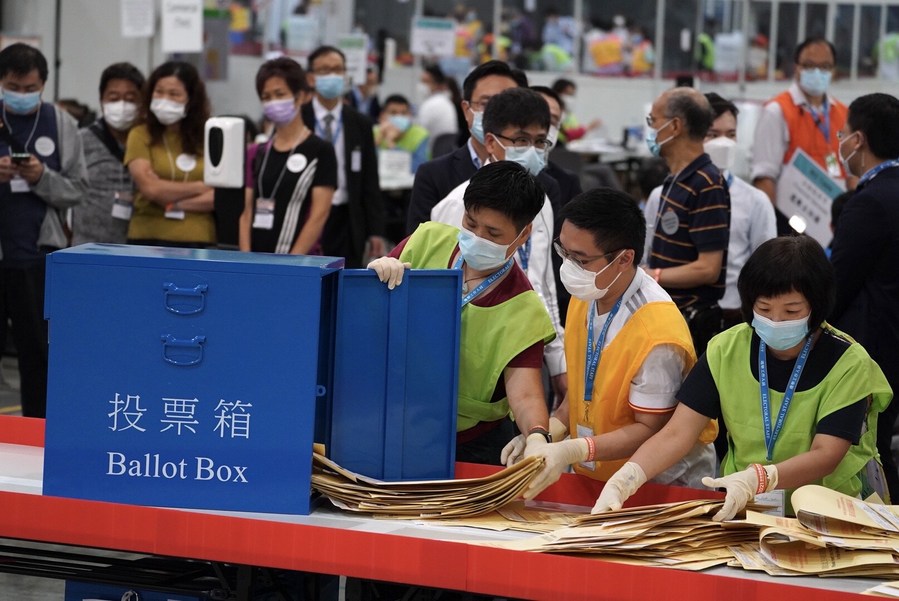HK LegCo candidates gear up for 1st election without threats and provocations; residents prepare to defend new normal by voting

Staff members work at a counting station in Hong Kong, south China, Sept. 19, 2021. (Xinhua/Lui Siu Wai)
It has been a very busy week for candidates running for the Hong Kong Legislative Council (LegCo) election, to be held on Sunday, as some of them have a packed schedule for campaigning, attending forums to mobilize the public to vote, and using all kinds of social media platforms. As Hong Kong will soon embrace its first LegCo election since the national security law for Hong Kong and electoral reform took effect, which bars radical anti-China and anti-government rioters from entering the local governance structure, the city is expecting a peaceful, rational and practical election, which, experts said, will also be the new normal for the political landscape.
"I'm optimistic for the upcoming election," said Lai Siu Chung, a 49-year-old bus driver, who attended a candidate forum at the Hong Kong Convention and Exhibition Center (HKCEC) on Friday. Lai told the Global Times that he believes 90 percent of voters who attended the forum will vote on Sunday. About 1,000 residents attended the forum with palpable high enthusiasm for election day, he said.
In the eyes of Hung Kam-in, a campaign manager of a candidate, this year's election campaign was smooth, secure and rational, and the patriotic voices were heard by more local residents.
"Previous LegCo elections in Hong Kong used to look like elections in the US in terms of campaign means, as opposition forces used inflammatory and emotional language to stir up the emotions of voters, making them vote with their emotions regardless of right or wrong, and incited confrontations with other candidates," Hung told the Global Times on Friday.
Hung, who spent around six hours every day since November to campaign at different communities, said more patriotic organizations showed up this year in streets and communities.
"They [candidates] liked to stand in streets encouraging people to vote because they feel much safer since the implementation of the national security law for Hong Kong and they know their campaigns will not be threatened," he said, noting that the opposition candidates are more rational this year and the radical opposition forces have been disqualified.
Ahead of the district council election in 2019, pro-establishment lawmaker Junius Ho Kwan-yiu was stabbed in Tuen Mun by a man who approached him with a floral bouquet and a hidden knife, sparking growing concerns over outspoken pro-government lawmakers being violently attacked by radicals.
While Western media outlets such as Reuters, Bloomberg and Al Jazeera, which have been covering Hong Kong issues in a biased and selective way for a long time, try to depict this year's LegCo election as "unfair" and a "selection rather than election," and amplify how tame election day on Sunday will be, more Hong Kong residents voiced support for the new election system and their expectations for the seventh LegCo that will commence in January 2022.
Under the national security law for Hong Kong and electoral reform that ensure only patriots govern the city, those shocking and chaotic scenes that occurred at the LegCo meetings in previous years won't be seen again, and the council won't be a place for meaningless political battles again, former lawmakers, scholars and local residents said.
New normal
The LegCo elections used to see intense conflicts as some radical candidates from the opposition often attacked their opponents fiercely, hyping some controversial topics and tapping into public sentiment against the HKSAR government or the mainland. But now the overall atmosphere is calm and candidates are competing with each other in a civilized way, Lau Siu-kai, vice-president of the Chinese Association of Hong Kong and Macao Studies, told the Global Times on Friday.
Under the principle of only patriots governing Hong Kong, "such manner should be a new normal for Hong Kong political life," Lau said.
Numerous campaigning took place in Hong Kong this week, all in a peaceful manner. But when some people looked back to the previous LegCo election or the district council election in 2019, they remembered candidates pointing fingers at each other, spreading rumors and even making personal attacks or insults.
"For the future, for ourselves," read banners in pink and blue attached on 100 double-decker buses, taxis and trucks, which made tours across the city on Thursday, attracting hundreds of residents. They waved banners encouraging the public to vote on Sunday, as the polling stations will stay open from 8:30 am to 10:30 pm that day.
Some residents cheered the "far-reaching significance" of the LegCo election, as a recent survey from research firm Zijing suggested that 70 percent of 1,528 registered voters recognized the fairness of the LegCo election under the new electoral system, featuring broad representation.
China's top lawmakers unanimously approved the electoral reform plan for Hong Kong in March, another major step following the implementation of the national security law for Hong Kong in fixing the loopholes in the city's governance structure.
In May, lawmakers in Hong Kong finalized amendments for the election overhaul which increased the seats of the LegCo from 70 to 90, including 40 seats from the Election Committee, 30 from functional constituencies, and 20 which are directly elected.
The electoral reform is designed to shield the city from rioting, citywide rampage and unprecedent social turmoil in 2019, as some former lawmakers who are also anti-China radical rioters played a major role in fueling the hatred and anti-government sentiment. But more importantly, the overhaul will end filibustering tactics commonly used by radical opposition lawmakers, who used the LegCo as a place for battling with the HKSAR government and lawmakers from other political groups, even if bills proposed by the government or other lawmakers were beneficial to Hong Kong society.
The Global Times discovered that at least 108 bills on livelihood, including medical, traffic, elderly care, and local infrastructure projects were delayed between 2014 and 2020, according to incomplete statistics, due to filibustering and other tools designed by opposition lawmakers to bring dysfunction to the LegCo.
For instance, many were shocked by a scene on May 28, 2020 when a former lawmaker from the opposition camp - Ted Hui Chi-fung, who absconded to Britain last year - dropped rotten plants in the LegCo chamber during the national anthem law debate, precipitating a six-hour break in the session.
When deliberations resumed on the afternoon of June 4, Hui was ejected after again throwing a plastic bottle containing a foul-smelling liquid even before the meeting had begun. Local officials and experts called it "complete chaos" that the LegCo - a place of debating on and adopting bills while supervising governance - no longer functioned normally.
When we look back, the LegCo used to be like a place to wage battles no matter what the circumstance was. Whether the bill was good or bad, opposition lawmakers fought against it only because they had a different political stance or ideological leaning, Tik Chi-yuen, a former lawmaker from the pan-democracy camp, told the Global Times in a recent interview.
"Turning the LegCo into a place for political battles over the past year served no good for theHKSAR government, political groups, Hong Kong citizens and social development," Tik said, noting that it should be a place for problem solving, not troublemaking.
After dozens of lawmakers from the opposition were disqualified for failing to fulfill the requirement of only patriots governing Hong Kong or resigned, thesixth LegCo (2020-2021) became highly effective as 124 of 128 proposed bills were passed, 50 percent more than previous LegCo sessions, where an average of 80 bills were passed, according to data from the website of the LegCo.
Without secessionist lawmakers, who only aimed to sabotage Hong Kong, we've done the work that had not been finished in the past four years, Ho, who is also running this year, told the Global Times on Friday.
"I believe we'll continue on this right path in the next LegCo, as some urgent bills need to be proposed," Ho said, noting that advancing Article 23, pushing forward the reforms in the judiciary and media, as well as deepening housing reform are among the top priorities.
Getting ready
The regional emblem hung in the Chamber of the LegCo was replaced with the national emblem on Friday as part of preparations for the oath-taking after the LegCo election on Sunday. The new lawmakers will take office in January.
As a major way of defying the upcoming election, foreign media outlets like the AFP highlighted possible low turnout, which is also a way foreign media outlets and observers used to question the legitimacy of the election.
"I think the turnout does not mean anything," Carrie Lam, chief executive of the HKSAR government, told the Global Times in an exclusive interview recently.
"There is a saying that when the government is doing well and its credibility is high, voter turnout will decrease because the people do not have a strong demand to choose different lawmakers to supervise the government," she said.
To echo the foreign media hyping of possible low turnout, secessionists and anti-government figures such as Nathan Law Kwun-chung and Ted Hui have been vocal on overseas social media platforms, calling on people not to vote.
Hong Kong local authorities enforced the law resolutely, and sued two people who reposted such inflammatory posts of Hui for the first time since the amendment of election-related local laws in May.
Although the city has restored social order under the national security law for Hong Kong and electoral reform over the past year, local officials warned of possible attacks on election day as there are still secessionists who colluded with external forces to seek occasions to subvert the authority and instigate another social turmoil.
The Hong Kong Police Force also told the Global Times in an earlier email that it would dispatch the appropriate police force on Sunday to ensure the LegCo election is held smoothly.
John Lee Ka-chiu, Chief Secretary for Administration, along with Erick Tsang Kwok-wai, Secretary for Constitutional and Mainland Affairs, inspected the central counting station at HKCEC, and Lee also described the upcoming election as the one of "the largest scale," as about 40,000 staff will handle the votes and counting.
As the election looms, Hong Kong is also expected to see the plan of resuming travel between the city and the mainland soon, as this serves as a boost to Hong Kong's economic recovery. And to facilitate the voting process for Hong Kong residents who live and work in the mainland, polling stations have been set up for the first time at checkpoints on the mainland-Hong Kong border.
Several Hong Kong residents told the Global Times that with the new election and the upcoming border reopening, they are more confident in Hong Kong's future development and their future.
Franky Yeung, manager for several companies in South China's Guangdong Province and founding president of the Hong Kong Island District Industries and Commercial Association, told the Global Times that he and some 20 Hong Kong residents who stayed in the Chinese mainland will vote at boundary control point polling stations in Shenzhen on Sunday, and many of them hope the new LegCo members will help accelerate the process of border reopening between Hong Kong and the mainland.
Cheung Kai-yuen, deputy president of the Kowloon Women's Organizations Federation, told the Global Times on Friday that she will "definitely" vote on Sunday, and her two daughters who live in Shenzhen will also drive to the polling station to vote.
Cheung said Sunday's voting is an obligation for all Hong Kong voters, and as the first LegCo election under the new election system and after the implementation of the national security law for Hong Kong, she will defend the new election system under the "one country, two systems" by voting.
She and other voters around her are pinning their hopes on the new LegCo members to improve people's lives, and they wish that the new members could truly speak for residents, and put forward constructive proposals on issues like housing, education, traffic and healthcare.
Photos
Related Stories
- U.K.’s interference in Hong Kong affairs to lead nowhere
- Hong Kong's export expected to grow 8 pct next year
- Hong Kong's overall interests to be represented under new electoral system
- Briefing held in Hong Kong on strengthening confidence in China's democratic system
- Hong Kong court orders winding up of Jimmy Lai's Next Digital
Copyright © 2021 People's Daily Online. All Rights Reserved.










